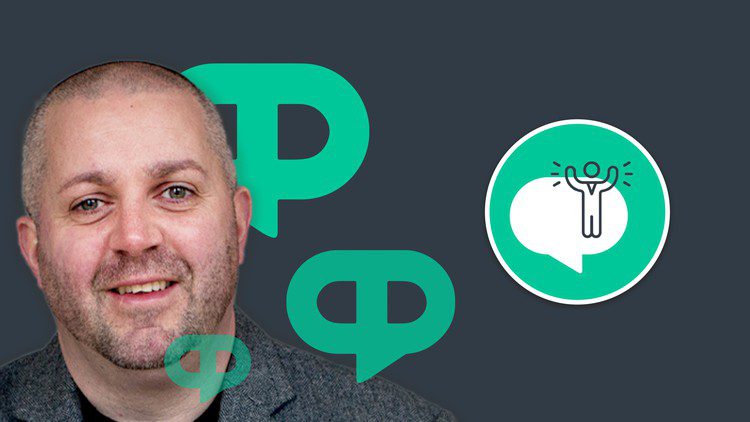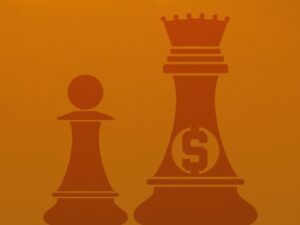Masterclass sobre confianza y autoestima auténticas
- Descripción
- Plan de estudios
- PREGUNTAS FRECUENTES
- Reseñas
In recent years, the term authenticity has faced a public relations crisis. The word ‘authenticity' has lost meaning due to its overuse in profit-driven advertising, on various social media platforms and even in style magazines. Today, most people claim to be authentic, but few of those who proclaim it have a comprehensive understanding of what authenticity really means.
Authenticity is the quality of being genuine or real. Authenticity is a matter of living in the moment with conviction, with confidence, and remaining true to yourself. An authentic individual is someone who naturally puts others at ease, and there's never any questioning of their integrity. Authentic people behave in a morally excellent, ethically predictable, and trustworthy manner – and have a low tolerance for superficiality or falseness.
With a level of authentic confidence, a person is able to make well-informed decisions, develop strong relationships, and conduct themselves in a manner that will earn the trust, respect, and admiration of others without having to dramatically change their appearance, beliefs or adopt extreme patterns of social behaviour. Due to a lack of genuine self-confidence, many people today build their lives on highly unstable ground.
Many people strive for authentic confidence but do not know how to achieve it. You can develop authentic confidence by taking time to define who you are, who you are not, and come to terms with the defects and shortcomings you were born with. Most people define themselves by their interchangeable characteristics. The act of doing so is perhaps the surest way to invite frustration and self-doubt into your life.
The following are some of the topics you will learn during this course:
-
A Model for Self-Awareness and Personal Growth
-
Essential Attitudes for Ongoing Self-Improvement
-
A Framework for Critical and Objective Thinking
-
A Basis for Evaluating your Beliefs and Worldviews
-
Confidence and Authenticity in Relationship Building
-
Separating your Personality from your Core Identity
-
A Process for Defining a Meaningful Life Vision
Generally, authentic people are reflective thinkers who see themselves as separate from others and as unique. A person who is authentic tends to be characterized by high moral standards and is recognized more for what they accomplish through their lives than by what they merely suggest they will achieve. In order to do so, one must have high levels of emotional intelligence. This includes self-awareness, discipline, and autonomy.
By the time you complete this thought-provoking program, you will have realized how most self-esteem issues and confidence issues are the results of simple misunderstandings that people make about themselves as children. The more familiar you become with these misconceptions, the more comfortable you will be in correcting them as needed. Once the main reasons for low self-confidence disappear, they remain gone.
Two types of human beings exist in the world. First, there are those who complain mindlessly about their circumstances, unwilling to accept responsibility for themselves and take control of their lives. Secondly, there are those who are determined to study, learn, work hard, and take whatever measures are necessary to improve their general quality of life. This training course is designed for that second type of person.
Knowing yourself authentically means understanding your uniqueness and accepting yourself for who you are. This Authentic Confidence and Self-Esteem Masterclass will guide you through a journey of self-discovery to help you uncover the truths about who you are and what you must achieve with your life. We will teach you how to drive progress in every aspect of your life by taking full responsibility for all aspects of it.
“I highly recommend this course. It combines psychology based ideas with real-life examples, to deconstruct many unhelpful thinking habits which have sabotaged my career efforts for years!” – Maisie A. Winchester
This training course is part of a larger curriculum of personal development training resources, designed by KR Ltd, and hosted within the Achology peer-learning environment. The training course is accompanied by a 30-day money-back guarantee, so if you're not happy with the format, you can get your money back – no questions asked.
-
1Introduction VideoLección de vídeo
Welcome to the Authentic Confidence and Self-Esteem Masterclass. Over the next 45 video lessons, you will learn how confidence is not the certainty that everything will work out 100 percent of the time. It’s knowing you have the ability to deal with the outcome and correct your course for success, regardless of how it turns out. Your instructor throughout this training is Kain Ramsay.
-
2Course Support and Frequently Asked Questions (FAQs)Lección de texto
As you have enrolled in this training course on Udemy, here is a convenient link to Udemy's most frequently asked questions database so that you can make the most of this online training as quickly as possible. This includes article responses to all of the most commonly asked questions that relate to taking a course on Udemy.
-
3Join the FREE Achology ‘Principles into Practice’ Discussion GroupLección de texto
Would you like to discuss the lessons you are learning in this course?
If so, you are welcome to apply to join the ‘Principles into Practice’ Discussion group.
The Principles into Practice Facebook group was founded in 2016 for the purpose of bringing together link-minded individuals from all around the world who are studying, or who have studied, Kain Ramsay or Achology associated on-demand training courses.
-
4Critical Traits for Continuous Personal GrowthLección de vídeo
It's important to establish the reason why we want to be more confident. If our bodies were vehicles, confidence is like the fuel that drives us, so it's important to establish what our end destination is - this is the only thing that will drive us to grow and develop. In this video, Kain introduces the course by discussing a highly practical pathway for your continuous personal growth.
-
5Crystallised Thinking Versus Fluid IntelligenceLección de vídeo
Are you rigid in your thinking? Science evolves as scientists test theories and makes new discoveries. Sadly, many people don't take this same approach to their lives and become fixed in their thinking about who they are and what they are capable of. Fluid thinking involves seeking new information and being open to evolving in our thinking. In this video, Kain unpacks these concepts in depth.
-
6Differentiating Between Your Actual Self and Ideal SelfLección de vídeo
The actual self refers to how individuals perceive themselves realistically, whereas the ideal self refers to how people would like to see themselves or how they would like to appear. This video discusses a teaching in which Kain provides a differentiation between our actual selves (who we are currently) and our ideal selves (the person we hope to become in the future).
-
7A Model for Self-Awareness & Personal GrowthLección de vídeo
Often our first reaction to something we don't like in ourselves is to defend ourselves, which is why self-awareness can be a challenge. How you conduct yourself publicly will be representative of how you identify and feel about yourself privately. As he uses the Johari Window model in this video, Kain helps you to establish a foundation for your own self-awareness and growth.
-
8The Eight Categories of ConfidenceLección de vídeo
Much of the self-help world promotes '5 steps to inner ultimate confidence' or similar, but this is nothing but misleading; the truth is we're either fully secure in who we are or we are not. In this video Kain outlines eight different categories of confidence for no other purpose than to provide you with a vision for the kind of people you might grow to become.
-
9Neisser's Levels of Self-AwarenessLección de vídeo
It's possible to be self-aware to some degree and still be unsatisfied and lacking in fulfilment. While self-awareness has many advantages, it is, by itself, not the point. Ulric G. Neisser was a German born psychologist who researched and wrote about the different levels of self-awareness. In this video, Kain explores these different levels to help you consider your own measure of self-awareness.
-
10Assessing Self-Awareness: How Self Aware Are You?Lección de vídeo
Self-awareness is an important characteristic to possess in our contemporary society, as it allows us to comprehend our own character and feelings at any given time. There is a significant difference between thinking and reflecting on something. The purpose of this video is for you to reflect upon a series of questions related to Neisser's levels of self-awareness.
-
11Ideas Are The Birth of All KnowledgeLección de vídeo
If you believe that you can or cannot, then you've already made your decision. It is your thinking that will determine the trajectory of your life. The combination of vivid and clear ideas in the mind obtained from information or experiences with good interpretation constitutes knowledge. Throughout this video, Kain explains one of John Locke's concepts on where ideas come from.
-
12The Human Experience: How We Interpret LifeLección de vídeo
In life, no experience has any meaning unless we assign a meaning to it; the way we misinterpret events is based solely on our perception. As Kain shows us in this video, understanding how we interpret our experiences in life and the consequences we experience as a result can help us to make sense of our behavior and emotions (and also where confidence, or lack thereof, comes from).
-
13The Four States of Human ConsciousnessLección de vídeo
We achieve freedom not when we are accepted by other people, not when we accumulate more material objects, but rather when we begin to accept our imperfections and failures. Throughout the video, Kain discusses the four elements that influence how much freedom we perceive ourselves to have; he then outlines the four different states of consciousness.
-
14General Attitudes for Ongoing Self-ImprovementLección de vídeo
As children, we are taught to compete in academics and to excel in our exams. School and college learning has always been geared toward academic courses, but what about self-improvement and personal development that play an equally important role in people's lives? As Kain explains in the video, you can adopt several general attitudes in your life to promote continual self-improvement.
-
15Perception: The Map Is Not The TerritoryLección de vídeo
Low confidence occurs when we attribute negative self-belittling meanings to our life experiences. We are constantly making assumptions about ourselves. Maps are limited and do not represent the territory accurately. The interpretations and beliefs that we have come to believe to be true are also limited and are not accurate depictions of reality. Kain explores these ideas throughout this video.
-
16Reframing: Becoming Elevated In Our ThinkingLección de vídeo
Our minds are where we wage our war. It is also the place of our victory. Thoughts become arguments, and arguments become strongholds. The meaning we assign onto a situation, or circumstance can change how we perceive it. By changing our perception, we will change our way of seeing, feeling and reacting to something. In this video, Kain discusses these ideas in greater detail.
-
17Circle of Concern Versus Circle of ControlLección de vídeo
According to the "Circles of Control, Influence and Concern" model, if we cannot control something, don't get upset about it, and if we cannot control something, don't focus on it or get upset about it. Healthy perspectives involve focusing on what we can change, not on what we cannot. Our lives will remain disempowered as long as we are swayed by things outside of our control. In this video, Kain discusses the circles of concern and control - and just see how they might be relevant to your life!
-
18Envisioning the Fully Functioning Human BeingLección de vídeo
Many people become addicted to happiness or success and spend their days trying to 'feel' better about themselves; it's only when we commit to growing and developing ourselves that we get to 'become better', and we become more confident as a result. In this video, Kain describes the characteristics of a fully functioning human being. They aren't attributes we arrive at; rather, they are traits that we are constantly working towards acquiring within ourselves.
-
19End of Section One Check-InLección de vídeo
In this video, Kain outlines a series of self-reflection questions that you can ask yourself to think about the main ideas and lessons you have learned throughout this section of the course so far.
-
20The Determining Factors of ConfidenceLección de vídeo
Many factors, both internal and external, influence confidence. The internal factors included personal perception and expectations, prior experiences (i.e., operational), and seeing personal skill development. As humans, we're all guilty of fortune telling and predicting how our lives might turn out. As Kain explains the determinants of confidence, he draws on S. Freud's Iceberg Theory.
-
21The Connection Between Thinking and OutcomesLección de vídeo
The power of your mind is immense. Most of us, however, rarely give much thought to the way we think. Who really thinks about thinking? However, your perception of yourself is your reality. You will limit your potential if you draw incorrect conclusions about who you are and what you can do. Your thoughts create self-perpetuating cycles. Feeling and acting are directly influenced by what you think. In this video, Kain offers a time-honoured model for understanding the human mind.
-
22Patterns of Destructive ThinkingLección de vídeo
Destructive thinking often lends itself to stress, and you can reduce your stress by altering how you think. That's right; destructive thinking can be changed. Most problems people face have to do with the accuracy and truthfulness of their thinking styles. In order to stay objective in life, we need to learn to step apart from our thoughts. The video explores unhealthy thinking patterns.
-
23Socratic Reflective QuestioningLección de vídeo
Socratic questioning refers to the process of asking questions in order to stimulate critical thinking and reflection. A socratic question is a type of open question in which people are invited to evaluate the accuracy (and correctness) of their thinking. In this video, Kain discusses the various socratic questions we can ask ourselves in order to challenge negative attitudes and perspectives.
-
24A Script for Developing Wise Reasoning SkillsLección de vídeo
In the event you have developed low self-confidence or low self-esteem, it is likely that you are unreasonable with yourself in your thinking. In general, people who suffer from negative emotional states have not yet learned how to evaluate their thought patterns and regulate their behavior. In this video, Kain offers another series of questions that can be used to challenge negative thoughts.
-
25The Pygmalion EffectLección de vídeo
Pygmalion effect is a psychological concept that describes how expectations can affect a person's behavior. It provides evidence for the self-fulfilling prophecy, which is based on the idea that people's beliefs become true upon acting and behaving that they are. In this video, Kain unpacks the 'Pygmalion Effect' which explains the self-fulfilling prophecy that spawns from our mindset in life.
-
26Fourteen Insidious Perspectives for LifeLección de vídeo
In his Cognitive School of Thought, A. Ellis proposed that the root causes of most unhelpful emotions and behaviors can be traced to a small number of core beliefs. Elis' beliefs are intentionally extreme in order to convey the idea that people are sometimes inclined to take exaggerated stances. Throughout this video, Kain takes the time to discuss each one of these beliefs in detail.
-
27Questions to Address Insidious PerspectivesLección de vídeo
Many people are constrained by their beliefs. The future is filled with opportunities, and it's waiting to be discovered. By taking control of your life, you can create the life you want. The only way to remove negative thoughts from your life is to take note of the ones that hold you back. This video presents questions for self-reflection by Kain that will allow you to consider your current beliefs.
-
28Self: The Road To Insight and UnderstandingLección de vídeo
Connecting the dots of our lives is crucial to understanding ourselves. Understanding ourselves is easier when we are more self-aware. We are then able to identify changes we want to make and recognise our strengths so to build on them. As we learn more about ourselves and our own lives, we become wiser. In this video, Kain illustrates this point with an example from his own life.
-
29In What Way is Your History Relevant Today?Lección de vídeo
The past is not the present. Your past is just that - your past. Your past shapes you as you are today, but it doesn't define how you need to go forward. Instead of dwelling on regrets, learn from your mistakes and move on. We all have the final say on whether we want to take our histories forward. Kain outlines an exercise to help you uncover how prevalent your past is currently in your life.
-
30Fourteen Self-Awareness Questions to AskLección de vídeo
Our ability to regulate ourselves begins only when we become aware of our emotional triggers. Kain provides a series of questions for self-reflection in this video, which if you take some time to answer, will assist you in identifying your own opportunities for further growth and self-improvement.
-
31How Do You Evaluate Yourself?Lección de vídeo
Assessing yourself is akin to walking on a path of mental progress. When you evaluate yourself as a person, you find your strengths and weaknesses. Life is all about finding your weaknesses, accepting them, and working on them. Comparison thinking is pervasive. By gauging our progress inaccurately, we can end up over-inflating ourselves, or even undermining ourselves unintentionally. Here, Kain poses questions and outlines an exercise to help you think about how you evaluate yourself?
-
32Some People Do Not Want You To GrowLección de vídeo
It is better to associate less with certain people. Successful individuals are impatient with those who think or act negatively. As you grow, your network will also change. Some people do not want you to grow and need you to remain as you are. Those that don't increase you will eventually decrease you. In this video, Kain discusses this idea giving examples of the type of relationships to look out for.
-
33Seven Types of Disconnected RelationshipLección de vídeo
We gain insights into ourselves as a result of interacting with others. Every relationship we invest time in will either enhance or detract from our lives. The more we can tell the difference, the more wise we are. Typically, in unhealthy relationships, one person will try to overpower or undermine the other through engaging in roleplay. This video examines the main types of conflict in relationships.
-
34The Disempowerment & Empowerment DynamicsLección de vídeo
Stephen Karpman first described the Drama Triangle in the 1960s. The model is a character study of dysfunctional social interactions illustrating how three roles represent a common and ineffective response to conflict: victim, rescuer, and perpetrator. In this video, Kain discusses the disempowerment dynamic and empowerment dynamic, drawing a comparison between them.
-
35The Hermetic Principles of Self-MasteryLección de vídeo
Hermeticism is a philosophical tradition based on the writings of Hermes Trismegistus. The practical application of these Hermetic principles attracted the attention of many humanistic psychologists back in the 1950s. If we want to become masterful in life, there are certain principles that we must consider and build our lives upon - Kain unpacks some of these principles throughout this video.
-
36End of Section Two Check-InLección de vídeo
In this video, Kain outlines a series of self-reflection questions that you can ask yourself to think about the main ideas and lessons you have learned throughout this section.
-
37The Stages of Progression and Personal GrowthLección de vídeo
The journey of personal growth is not something that human beings invented. It has been here since the dawn of time. Individually, we decide where we want to lead our lives. Growth is something that many people strive for and devote their lives to. Other people focus on feeling happy and other such minor things in life. Kain breaks down the stages of progression and personal growth in this video.
-
38Maslow's Hierarchy: What Drives You in Life?Lección de vídeo
What people commit to in life will determine the results they achieve. If we want to progress in life, it's crucial to focus on our own self-motivation and to carefully think about our goals. In this video, Kain explains Abraham Maslow's famous Hierarchy of Needs, which describes the need for human beings to have their varying needs met in life.
-
39“To Be The Self Which One Is”Lección de vídeo
Every once in a while, it is inspiring to meet and admire someone who is completely genuine, despite their situation, circumstances, or attitude. In being 'real,' we expose ourselves and take the biggest risk we can take in life. Accepting who we are is key to overcoming low self-esteem and low confidence. Kain discusses Soren Kierkegaard's proposal, “To Be The Self Which One Is” in this video.
-
40Self Reflection: How Real Are You?Lección de vídeo
Everyone is different. All people have their own niche in life, whether they are comedians, nerds, great cooks, athletes, or love politics. Finding out who you are and accepting who you are is a healthy way to live. When you discover yourself, you will become confident about learning new things, visiting new places, and meeting new people. The purpose of this video is to build on Kain's other teachings as well as to introduce several questions for your own reflection.
-
41A Guide for Accurate Self-IdentificationLección de vídeo
Identifying ourselves by what we do makes our identity dependent on our performance. There are many ways in which people define themselves that limit their potential for growth and expansion, which negatively affects their self-esteem and self-confidence. Throughout this video, Kain offers a framework for appropriate, positive, and unrestrictive self-identification.
-
42Foundations for Authentically Defining the 'Self'Lección de vídeo
Even though we all want to be honest, transparent and authentic with the other people in our lives, low self-esteem and low confidence can sometimes undermine our best intentions. There is great importance to developing a set of strong foundations for authentically defining yourself, and in this video, Kain provides some practical insights into how you can begin to accomplish this.
-
43Defining Your Core IdentityLección de vídeo
Identity must become a constant in our lives. Making peace with our imperfections is the same as making peace with who we are. Core Identity is what defines a person as a unique individual. This "Core Identity" is characterised by both attributes belonging to and describing the individual. In this video, Kain introduces a practical exercise aimed at helping you define your true core identity.
-
44A Model of PersonalityLección de vídeo
Ignorantly, some people define themselves by their interchangeable personality traits. This is one of the easiest ways to undermine one's self-esteem and confidence. A German born behavioural psychologist, Hans J. Eysenck developed a model of personality flexibility. Kain breaks down Eysenck's model and argues that how we identify will influence our willingness to change and grow.
-
45Defining Your Greatest Life VisionLección de vídeo
Does having a vision make it easier to change your life, or does being able to change your life make creating a vision for your life easier? Defining what success means to us will help us define what we can achieve and how we can hold ourselves accountable. Kain introduces an exercise that helps you determine what it is that you wish to ‘be remembered for’ in this video. Give it some thought!
-
46The 'Good Enough' PrincipleLección de vídeo
There are many people who are affected by not feeling good enough, which can either be a result of internal or external factors. The most important internal factors are your beliefs about yourself and your abilities, as well as the self-talk you engage in. People tell themselves they are not good enough if they fail a test, don’t perform at work, or lose a contest. It is very common for people to allow one incident to color the rest of their lives. Our discussion here will focus on the “good enough” principle.
-
47Closing Thoughts & Recommended ReadsLección de vídeo
This high-level discussion brings us to the end of this course - and by now, it’s likely that you have developed a whole new outlook on life. In this video Kain outlines a series of self-reflection questions that you can ask yourself to consider the main ideas and lessons you've learned throughout this section. He brings the course to a close with a few recommended reads and some closing thoughts.
-
48Just Be Yourself Part 1: The ElementLección de vídeo
Our element is something that we must invest time into exploring, what is it that we love, what is it we're actually good at and what it is we enjoy doing so much that we can't help but share it with others.
This thing, whatever it is - we would do for sheer pleasure, whether we're paid for it or not - this thing is our direction, this is our purpose, THIS IS OUR ELEMENT!
Unshakable Confidence | The Ultimate Self Esteem Formula
-
49Just Be Yourself Part 2: Getting OK With You!Lección de vídeo
The world of psychology describes comparative judgement as the judgments people make about whether there is a difference between two or more people (or stimuli).
Imagine how different your life would be, if instead of comparing yourself to other people all the time, you instead made a habit of comparing yourself to you?
See how much you have grown, what you've achieved, the progress you've made and how you have developed your abilities over the years. Imagine how you'd feel each day if you compared yourself to how you were 10 years ago?
This habit has the benefit of creating gratitude, appreciation and kindness towards yourself as you observe how far you have come, the obstacles you have overcome and the good stuff you have done.
You'll feel much more confident about yourself without having to think quite as much about what other people think about you!
Unshakable Confidence | The Ultimate Self Esteem Formula
-
50Just Be Yourself Part 3: Getting Out There!Lección de vídeo
If you don't believe in yourself, don't ask anyone else to do so!
It is virtually impossible not to transmit your doubts and insecurities to others through body language, tone of voice, inflection, word choice, and other subtle characteristics.
When you show by your actions that you lack self-confidence, other people also begin to doubt your ability to perform even the most insignificant of tasks.
To gain the respect and confidence of others, start by making a list of all the attributes that make you who you are, followed by the areas you could do with some work in! Make a conscious effort to build upon your specific strengths and just improve on your weaknesses (if they're even important).
It may not be easy, but if you assess yourself objectively and persevere in your efforts, you will eventually prevail .... like my wife Karen, If in this video you think that she looks confident - I can guarantee you that she wasn't, but simply done what she had to do anyway.
Feel the fear and do it anyway!
Unshakable Confidence | The Ultimate Self Esteem Formula
-
51The 9 Habits of Highly Confident PeopleLección de vídeo
"With confidence, you have won before you have started." - Marcus Garvey
Confidence is often the single differentiator between people who get what they want in life and people who don't.
Those who think and believe they can do something, i.e. run a marathon, start a new business, ask someone on a date (and have them say yes), win a competition, build a new social circle of friends, well ... they all do it.
Our mind is a powerful tool, and the impact of our thoughts and words cannot be undermined. Our thoughts create our emotions; our feelings create actions, our actions create our life. Confident people have complete control over their minds and tune their thinking towards an 'I can achieve anything' channel!
Here're nine things that confident people do that you can apply to your life:
-
52Exercise 8: The 'Yes' ProjectLección de vídeo
Now and then, when we find ourself at a loose end and the potential for boredom looms, there's a little challenge that you can embark upon that's great for boosting confidence and expanding your expectations of ourselves.
Nothing special, nothing groundbreaking, just a little project that breaks down a fear or takes some practice and perseverance to compete. The 'YES' Project.
Unshakable Confidence | The Ultimate Self Esteem Formula
-
53Unshakable Confidence Recommended Reading ListLección de vídeo
No good course would ever be complete without it's very own list of reccomended reads for further study and investigation. So, here goes ....
Unshakable Confidence | The Ultimate Self Esteem Formula Recommended Reading List
-
54Summary & CloseLección de vídeo
This video brings the course to a close (for now), and I can only thank you once again for enrolling in the first place, and also for putting your trust in me as your coach.
Moving forward, I will continue to develop the course by adding new resources and study materials (and please feel free to get in touch with me directly if there are topics that you'd like me to produce future videos on).
But other that this, God bless, all the best and I'll look forward to hopefully seeing you again in one of my other courses ;-)
Kain
Unshakable Confidence | The Ultimate Self Esteem Formula


Las cookies son pequeños archivos de datos que un sitio web envía subrepticiamente a su computadora, a menudo en forma de archivos de texto o archivos de imágenes. Las cookies nos permiten almacenar o recuperar información sobre su navegador, que podría usarse para identificar quién es usted. Estos datos generalmente se utilizan para hacer que el sitio funcione como usted espera. Tiene la opción de optar por no recibir algunas cookies ya que valoramos su privacidad. Para obtener más información y cambiar su configuración, haga clic en uno de los títulos de categoría a continuación. El bloqueo de ciertos tipos de cookies, por otro lado, puede perjudicar seriamente su experiencia en el sitio y el acceso a los servicios.
Estas cookies permiten que el sitio web brinde una mejor funcionalidad y personalización. Pueden ser establecidos por nosotros o por terceros proveedores cuyos servicios hemos agregado a nuestras páginas. Si no permite estas cookies, es posible que algunos o todos estos servicios no funcionen correctamente.
Las cookies que hemos establecido en este sitio para permitirle compartir nuestro contenido con sus amigos y redes son la razón por la que existen estas cookies. Pueden realizar un seguimiento de su navegador en diferentes sitios y crear un perfil de sus intereses. Esto puede influir en el material y los mensajes que ve en otros sitios web. Es posible que no pueda usar o ver estas herramientas para compartir si no acepta estas cookies.
Las cookies de socios publicitarios pueden utilizarse en nuestro sitio web para crear un perfil de sus intereses y mostrar anuncios relevantes en otros sitios web. No recopilan información de identificación personal, aunque se basan en la identificación única de su navegador y dispositivo de Internet. Recibirá publicidad menos dirigida si rechaza estas cookies.
Estas cookies son esenciales para el funcionamiento del sitio web y no se pueden desactivar en nuestros sistemas. Por lo general, solo se configuran en respuesta a acciones realizadas por usted, que equivalen a una solicitud de servicios, como configurar sus preferencias de privacidad, iniciar sesión o completar formularios. Puede modificar la configuración de su navegador para bloquear o alertarlo sobre estas cookies, pero algunas partes del sitio no funcionarán correctamente si lo hace. Estas cookies no almacenan ninguna información que pueda identificar personalmente a alguien.
Contar las visitas y medir la actividad es esencial para mantener un sitio web con un buen rendimiento. Estas cookies nos permiten hacer precisamente eso al proporcionar información sobre qué páginas son las más o menos populares, cómo se mueven los usuarios por el sitio, etc. Sin estas cookies, no podríamos mejorar el rendimiento de nuestro sitio.

Únase a nuestro círculo interno y nunca pierda el ritmo
Nuevos cursos, nueva información y nuevas habilidades tienen el potencial de mejorar drásticamente su vida. Asegúrate de no perderte ninguno y mantente informado automáticamente.
* Odiamos el spam y te prometemos no enviar nada que no quieras. Al registrarte aceptas nuestros política de privacidad.










